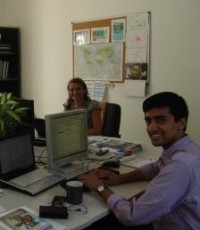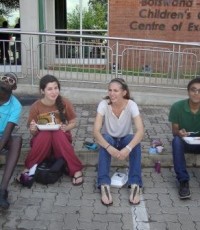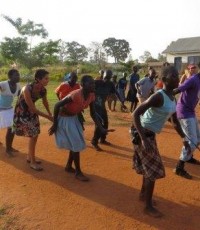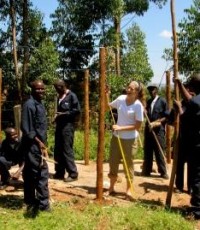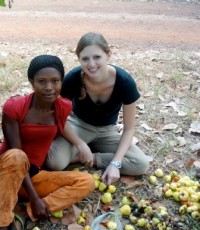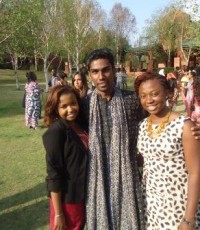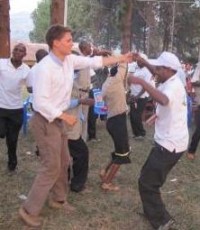March - April 2013
Our Fellows spend their year in Africa working hard, but as you’ll see in this Fellows Flyer, they also find time to learn traditional Acholi dances in Uganda, play ukulele in a bluegrass band in Senegal, and reflect on beauty in Burundi.
Three Princeton in Africa staff just returned from our annual trip to Africa – together, we visited 12 countries across the continent. It was wonderful to see our Fellows in action and to catch up with alumni who continue to work in the field. Additionally, we enjoyed strengthening our relationships with current (and new!) partner organizations.
But the most enjoyable aspect of our trip was coming together with 39 Fellows in Kampala for our mid-year retreat. Our 2012-13 Fellows and staff were joined by PiAf Co-Founder Frank Strasburger and several PiAf alumni for four days of community, reflection and downright fun. Our Fellows had a chance to share stories about the work they are doing with our inspiring partners, to discuss personal challenges, and to set goals for the remainder of their fellowship year. We also hosted an enlightening international career panel, featuring the US Ambassador to Uganda, the USAID Mission Director to Uganda, and country directors of several fantastic organizations, among others.
Since our return, we have begun placing another incredible group of Fellows for our 2013-14 fellowship year. We are honored to announce three new partner organizations joining the PiAf family this year – Gardens for Health International in Rwanda (which has a former PiAf Fellow as the Executive Director!), Clinton Health Access Initiative in Uganda and Village Enterprise in Kenya/Uganda.
Enjoy this edition of the Fellows Flyer and learning about some of our Fellows in Botswana, Burundi, Ghana, Kenya, Senegal, South Africa, and Uganda!
Katie Henneman
Executive Director
PiAf Connections
Please click below to check out pictures of our Fellows, Alums and other members of the PiAf family meeting up at home and around Africa.
Notes from the Field
By Abhit Bhandari, 2012-2013 Fellow with World Food Programme in Senegal
My commute to work takes me past makeshift houses constructed from cardboard, five-star hotels, fish markets, the Supreme Court, an ominous-looking theme park called “Magic Land,” and a prison. All these sights share the same road—a long stretch of two-lane highway, bordered by a breathtaking vista of seaside cliffs to the West and the grungy-yet-beautiful frenzy of the city to the East. And this is precisely how I’ve come to see Dakar: a city of unfathomable contrasts, unexpectedly unified by its energy and sense of community.
Like Dakar, my fellowship year has comprised many contrasts. As the Nutrition Fellow for the United Nations World Food Programme, my work plunges me into the intricacies of food security and nutrition policy. Working in the West Africa Regional Bureau, which oversees and helps coordinate WFP’s operations in 19 countries in the region, has provided me the perspective of how a large, multinational organization like the UN operates at such a massive scale. Yet it also means that I work at a largely administrative level—liaising between various country offices, aiding in the construction and editing of reports, and facilitating increased internal organization and efficiency. My work has proved incredibly engaging, interesting, and rewarding, yet there is an obvious contrast between what WFP does at the field level and what I do in the office. Getting this firsthand perspective and observing this contrast, however, has been invaluable in gaining knowledge of WFP and of the United Nations as a whole.
The activity that eats up a lot of my free time here is another very large contrast from what one would typically expect in Dakar: I play in a bluegrass band. I brought my ukulele and mandolin to Dakar, not expecting to play with anyone, but very soon I met a banjo player (a British journalist who’s been in Senegal for over 10 years) and a folk singer (an American who has worked as a psychologist in Dakar for the past 3 years). And thus, the Sahelbillies were born. We spend weekends sipping tea in our banjo player’s garden, chatting lazily, and wiling away the hours playing music. We’ve even played at a couple of parties and open mic nights at clubs in Dakar. It’s been entirely unexpected and somewhat bizarre, but it neatly fits into Dakar’s sense of community through contrast.
Dakar is a vibrant, energetic, and eclectic city, and I can’t pretend that I’ve made sense of it all. I’m not sure I ever will. For now, I’m quite content with my morning commute on the two-lane highway, looking alternatively between the tranquil ocean and the bustling city.
Notes from the Field
By Annette Dekker, 2012-2013 Fellow with Baylor International Pediatric AIDS Initiative in Botswana
Bring me something to help me through the day whoa whoa whoaaaaaa. As the words fade away and the house beats so typical of any street corner in Gaborone resurface, Keneilwe* continues to follow the rhythm of the song. As she drops down from the stage to try out a new spin move, the teens in the audience erupt into wild cheers.
This was November Teen Club at the Botswana Baylor Children’s Clinical Centre of Excellence in Gaborone, Botswana – the clinic where I am fulfilling my Princeton-in-Africa fellowship. One of my primary responsibilities is designing and implementing Teen Club, a monthly psychosocial support group for HIV positive adolescents. My colleagues and I had felt that the November Teen Club should be fun and the end result was a talent show.
I had given the teens no instructions other than that they were free to perform whatever and however they liked. The creativity and fearlessness with which the teens approached the talent show amazed me. Several of the older teens performed a skit teaching the younger teens about the challenges of living with HIV, another girl read aloud a poem she had written, and, of course, many of the teens danced. Keneilwe was one of latter.
As I sat watching Keneilwe dance, a phone conversation with one of the teen’s grandmothers came back to me. “Teen Club?” the Motswana mme (mother) had asked, “I’m not sending my granddaughter to a club!” It took me a moment to realize that she had assumed Teen Club was a nightclub. I jumped to correct the misunderstanding, explaining that our Teen Club – held Saturday mornings at the clinic – is designed to empower teens to build positive relationships, improve self-esteem, and acquire life skills through themes such as ‘Normalizing Your Life’ and ‘Career Day.’ At the time, I hadn’t realized our November Teen Club would include a DJ.
Orlando hey orlando. The song requested over and over again the day of the talent show is called Via Orlando. It’s a remix that echoed out from every store in the months preceding the holidays. Although normally a shy thirteen-year-old, Keneilwe was able to fully express herself through the music. And the support she received was overwhelming. As she kept dancing, teens and volunteers alike brought tokens to the stage to demonstrate their admiration. A hat. Several coins. Even a set of car keys. As the music came to an end, one of the older teen leaders lifted Keneilwe high into the air and the teens swarmed around to congratulate her.
That image – Keneilwe high in the air supported by her peers in the lobby of the clinic on a Saturday morning – has stayed with me. It represents so much of my year here, for at the heart of my fellowship is the work I do with the teens. The passion, support, kindness, energy, and insight that radiated out from Teen Club that November morning leaves me not only excited for a potential career in pediatrics, but inspired for the next generation of Batswana.
*Name has been changed to maintain privacy.
Notes from the Field
By Neha Dubli, 2012-2013 Fellow with Invisible Children in Uganda
Dear little sister bear,
The last six months here at Invisible Children Uganda (ICU) have been some of the most self-reflecting months I have experienced since graduation. I came out here expecting to grow, but never realized the extent to which I would fail and learn from these experiences.
Being the Monitoring and Evaluation Assistant with ICU has been a great introduction to development aid work analysis. ICU has many programs that range from scholarship initiatives, mentoring programs, livelihood platforms that include functional adult literacy, village savings loan and WASH projects, to social enterprise sectors and infrastructure for schools. Working with all these programs, I have experienced my fair share of learning from failure. Whether it may be failure on my part, or failure on the implementation of programs, it’s been an organic marriage of failing and learning together. However, my most fun failing experience thus far has been when I started to take traditional Acholi dance lessons.
Having taken dance lessons before and an African dance class as an undergrad, I walked in with way too much confidence for my own good. The drums started to beat and I could immediately tell this was going to be a fast pace cardio workout I was not ready for. I was hip thrusted into the circle and within seconds I realized how out of sync I was with the rest of the group. Girls younger than me had better rhythm and coordination to put me to shame. It was a colossal failure to the beat of the courtship dance. I spent the next four hours miserably making a riot out of myself in front of the whole town, yet I never felt embarrassed at any moment. They supported my efforts and guided me through each step. I came out with a few ingrained steps, however still a long ways from being the Acholi Michael Jackson.
I guess in a way this failure was similar to many of my other learning experiences here. I fail flat in front of everyone, yet they are eager to help me up and guide me through the steps. Being a perfectionist and Type A personality, failing at tasks has been new practice for me. However, due to the welcoming and loving affection of my coworkers and the community here, it truly has been the most exciting learning experience thus far. I can solemnly say that I have learned more about me here in the past six months than two years’ worth of internships back home in NYC.
Basically, little sister, I want to let you know, you now have a sister who is mastering her way through various Acholi dances and is eager to share them with you. Can’t wait to see you and boogie down to Agere dance moves.
Love,
Neha
Notes from the Field
By Ida Posner, 2012-2013 Fellow with access:energy in Kenya
I live in Kisumu, Kenya, a city that despite being the third largest city in the country has a definite small, lakeside town feel to it. Although I sometimes find myself missing the comforts of life in a more developed city, I am extremely lucky to be a part of the less than 16% of the country’s population who have access to electricity. I work at access:energy, a startup renewable energy company dedicated to bringing renewable energy resources to the people of Kenya.
In December, I had the opportunity to travel to Rusinga Island, a sizable island in Lake Victoria, to spend a week learning about permaculture alongside thirty local farmers and a handful of expats. Prior to the start of the course, access:energy had installed a small solar energy system at the eco-village where the course was taking place to provide lighting, phone charging, and electrical outlets for the center. It was a simple installation, consisting of a few solar panels, batteries, and cables, but remains one of the very few reliable sources of electricity in the community.
During the course, I stayed with a local family at their home on a hill overlooking the eco-village and the lake. The community is not connected to the national grid and at night people rely on lanterns and flashlights for light. The first night I was on the island I sat watching the light change over the lake as the sun set. As it got darker, you could see tiny lights from fishing boats beginning to dot the lake. Soon, the lake seemed to be filled with these lights, slowly moving past each other and occasionally breaking apart to reveal two lights where there once was one.
These fishermen use kerosene lanterns to catch Omena, a tiny protein-rich fish found in Lake Victoria. One of the larger projects we have been working on over the past year is a micro-grid installation on Rusinga where fishermen can rent and recharge LED solar lanterns to replace the kerosene lanterns that are traditionally used. Not only are the LED lanterns more efficient and cost effective, they also eliminate the harmful health and environmental effects that come from the kerosene fumes.
While sitting on the hillside, I realized that this was the perfect image to capture the work we do at access:energy. Besides the lights from the fishermen, the only other lights on that side of the island came from the gate of the eco-village, powered by solar panels. The potential for renewable energy in Kenya is enormous and it is often most apparent in the most rural parts of the country, where grid power just isn’t an option. On Rusinga, we have the potential to completely change the way in which energy is used and to improve the livelihoods of the local communities. I’m looking forward to returning to Rusinga in a few months time, looking out over the lake, and knowing that all of the lights you can see are powered by renewable energy.
Notes from the Field
By Meredith Ragno, 2012-2013 Fellow with African Cashew Alliance in Ghana
Pick, pull, plop. Pick, pull, plop. This is the sound of cashew nuts being plucked from fallen apples scattering the ground of Mim Cashew, a farm and processing plant in Ghana that I am visiting. I watch as Margaret and Fusenia, two “pickers,” sit in the dappled shade under one of hundreds of cashew trees on the farm, beginning the process that will eventually result in a can of cashews on the shelves of your local grocery store.
I’ve traveled to Mim, located about 240 miles northwest of where I live in Accra, to document the effects of the African Cashew Alliance’s Food Safety, Quality and Sustainability Seal on farmworkers. The ACA Seal program is a certification for cashew processors verifying that their factories adhere to international food safety and quality standards. Buying Seal-approved cashew helps guarantee that the next handful of cashews you eat is safe, delicious, and socially responsible. While the Seal has many benefits for consumers and snack companies, perhaps the most compelling impact of the program is the trickle-down effect it will eventually have on farmers.
The high quality product sold under the ACA Seal can fetch higher prices on the international market, which will eventually result in increased income for everyone along the cashew value chain – from trader, to processor, to farmer. An important part of my role on the communications team at ACA is to convey these positive effects to some of our biggest supporters, from philanthropic organizations like the Bill and Melinda Gates Foundation, to international government agencies including USAID, to big corporate players such as Kraft Foods. While most of the time that means sitting in my office producing reports, presentations, and managing our website, there are times, like this trip to Mim, or traveling to Benin to help put on the world’s largest cashew conference, where I get to see and hear firsthand the significance of ACA’s development work in Africa.
Although roaming cashew orchards with a camera or sitting and interviewing Margaret while she harvests kilos of cashews is by no means a typical “day in the life” during my fellowship at the African Cashew Alliance, it’s the kind of experience that reminds me why I wanted to do a Princeton in Africa fellowship in the first place – for the unexpected. It’s the same feeling I get when, despite the frustration of coming home to darkness during a daily power outage, I manage to cook a delicious dinner by candlelight. Sometimes things might end up a little crispy, but the unexpected challenge makes it all the more exciting and rewarding.
Notes from the Field
By Liz Wan'gu, 2012-2013 Fellow with African Leadership Academy in South Africa
I read about African Leadership Academy when it first started in 2008 and was fascinated by its impressive and ambitious mission of transforming the African continent by developing the next generation of African leaders. Ethical and accountable leadership in various spheres and sectors is largely what the continent currently needs and will need in order to have widespread and sustainable development. The more I continued to learn about ALA and its growth and successes since its inception, the more I wanted to be involved in working towards supporting their mission.
When I applied to PiAf, I indicated a strong interest in working at ALA. Honestly, it was out of my own curiosity, skepticism, and desire to learn more about how the model of an institution with fewer than 200 students was going to transform the second largest continent in the world. I was lucky to be appropriately placed in a Communications role, where part of my job tasks satisfied my own curiosity, as I quickly had to holistically learn about the organization, learn about and engage with former and current students, and also understand the organization’s strategic priorities and future plans.
Johannesburg and working at ALA has been rewarding, challenging, and has led to a major paradigm shift in how I view the future of my continent.
My work has been rewarding, inspiring, and challenging (in a good way), and so have my relationships with the amazing colleagues and especially the remarkable ALA students.
A paradigm shift, because my single-minded view of ‘how to develop Africa’ has definitely expanded. I always thought of effective development in Africa in terms of foreign policy. I thought the most effective way to ‘do development’ in Africa was through advocacy for fair foreign policy as it applies to Africa, since I believed that biased international policy was one of the biggest hindrances to the growth on the continent. ALA’s mission and vision is a very different and more empowering perspective on long-term sustainable development for Africa. Learning and seeing the different ways that African youth have already impacted the continent, even on a micro level, has shown me that there are other collective and effective ways to ‘do development’ in Africa, that don’t require and rely on changing or creating new international policies.
Yesterday, we celebrated Founder’s Day at ALA or the fifth ‘birthday’ of ALA. I must say that in the past five years, and definitely in the last six months, my perception of ALA has changed from fascination, curiosity and skepticism, to appreciation and understanding.
While there are definitely a string of days where I’m homesick and a little tired of work, there are more days when I am inspired by the work that ALA does, inspired by the young leaders at this Academy, and excited to be playing a small part in it all. ALA, like PiAf, has been nothing short of an extraordinary experience thus far.
Notes from the Field
By Bjorn Whitmore, 2012-2013 Fellow with Lutheran World Federation in Burundi
The drive between Cankuzo in eastern Burundi, where I am based with Lutheran World Federation (LWF), and Bujumbura, Burundi’s capital, takes about 5 hours. The drive takes me between our field office in Cankuzo, where LWF works to empower vulnerable households and youth in rural communities to help them take control of their own development, and the management office in Bujumbura. This unavoidable gap between the exotic isolation of rural Burundi and the internet, partner organizations, and social opportunities that Bujumbura holds has become one of the most significant aspects of my time in Burundi.
As we pull out of Cankuzo, I am usually reflecting on a week’s worth of work in Cankuzo: How I can make my interactions during field interviews more fluid? How can I find honest, open answers to my questions? What is the best way to gain the confidence of my colleagues? Then I catch myself smiling at the fact that these questions are actually part of my job and that answering them is highly important to the monitoring and evaluation and communications work I do for LWF.
Eventually I get distracted by the rolling green hillsides and begin to reflect more deeply on my role as an American suddenly inserted into the lives of so many Burundians. I can see the value I bring to my organization, but can I assume this is bringing something to the lives of the others around me? Do I enjoy or resent the celebrity status that comes with being the only white person living in this isolated province? Should my personal and professional gains from this experience be a source of guilt when considering the potential lack of benefit for those who are contributing to this experience?
At a certain point, with Cankuzo several hours in the background, the light on the red soil illuminates tiny hillside parcels and the endless wave of brightly-clothed bodies bearing impossible loads along the road unify the human and natural aesthetic of Burundi to reveal its overwhelming beauty. These are the moments when I become fully aware of the personal opportunity Princeton in Africa has offered me and promise to never let go of Burundi.
For the next hour, we follow the steep mountain contours north of Bujumbura. As I watch the deep green banana fronds kaleidoscope up the mountainsides, my reflections are constantly interrupted by stops to bargain for vegetables and the truck is instantly engulfed by enterprising merchants shoving cassava dough, tomatoes, and chickens through the open windows.
From there it’s only a couple more deep breaths of mountain air before the slopes give way to a panorama of Bujumbura lazily resting on the northern tip on Tanganyika with the D.R.C. rising in the background. Before I start thinking about looming grants and report deadlines or, on Fridays, who will be at the beach tomorrow, I interrupt my colleagues’ urgent discussions of rising food prices with one final thought: “Burundi really is incredible.”






